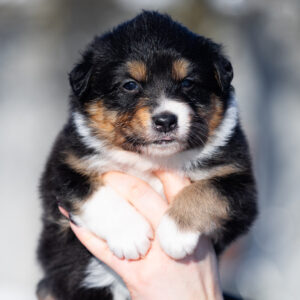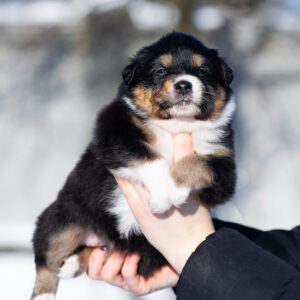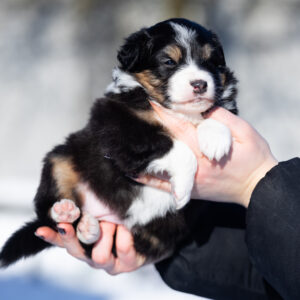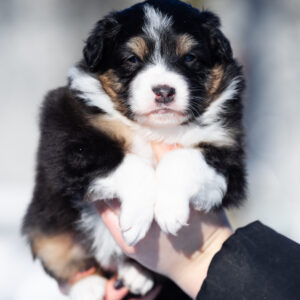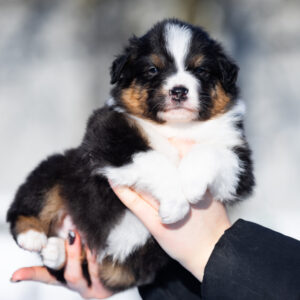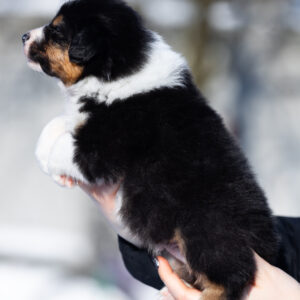
Australian Shepherd
This herding dog has a sleek coat that comes in many colours, including tricolour, bicolour, and merle. Although cautious with strangers, they are affectionate with their family, if sometimes prone to guarding behaviours. The Australian Shepherd is incredibly smart and energetic, so if you love to be outdoors or are interested in canine sports, the Australian shepherd could be the breed for you.
Australian Shepherd breed attributes
About Australian Shepherd breed
Description
The “Aussie” is a sleek, strong dog, suited for a tough day of ranch work. The muzzle is somewhat tapered, the high-set ears are floppy, and their oval eyes have an intelligent expression. Their strong straight back slightly slopes near the tail. The slim legs end in compact, oval feet, with thick, tough paw pads. Although some Australian Shepherds are born with bobbed tails, the majority have a long tail: some choose to dock their dog’s tails, but this banned in many countries.
Origin: USA
Look
The Australian Shepherd has medium length hair, which can be wavy or straight. The fur is much longer on the belly, tail, and back the legs. Most Aussies also have a beautiful thick mane of fur covering the chest and neck, especially in male dogs. The breed comes in many different colours, such as red, black, blue merle, red/liver merle; and patterns, including bicoloured and tricoloured variations. The Aussie tends to have differently coloured eyes, and may even have two different colours in one eye.
This breed is a moderate shedder: they shed all year round, and have an especially heavy shed in springtime as they lose their winter coats. The Australian Shepherd’s coat does need a fair amount of maintenance, such as weekly brushing and perhaps a trim to keep it tidy. You may need to spend a little extra time carefully working out knots and tangles in the longer strands of fur.
Health
While generally a healthy breed, the Australian Shepherd can suffer from one or more of the following health issues:
- Allergies
- Cancer
- Deafness
- Drug sensitivity
- Elbow dysplasia
- Epilepsy
- Eye problems, including:
- Cataracts
- Collie Eye Anomaly
- Detached Retina
- Distichiasis
- Persistent Pupillary Membranes
- Progressive Retinal Atrophy
- Hip dysplasia
- Hypothyroidism
- Nasal Solar Dermatitis
- Osteochondrosis Dissecans (OCD)
At Newdoggy.com, we recommend that you buy your dog from reputable breeders, who use genetic testing and good breeding practices to remove genetic conditions from their breeding lines.
Learning
The Australian Shepherd is incredibly clever, and a quick learner too. This breed really thrives from learning – if you don’t teach your Aussie, he/she will probably invent some tricks, such as herding children or chasing cars!
A bored Aussie can create havoc, but if you embrace their intelligence and energy, you will be amazed at how much they can learn. Many owners have taught their Australian Shepherds to help with chores around the house, such as picking up laundry. If you like canine sports, the Aussie is an excellent choice, excelling in everything from herding to obedience.
Temperament
The Aussie is a high energy breed, and demands attention. They absolutely adore their family, and are incredibly loyal and gentle with them, but tend to be reserved with strangers. This makes them good watchdogs, but be sure to properly socialise your Australian Shepherd, as this reserved nature can escalate to aggression towards strangers. The Australian Shepherd has a reputation as a “Velcro” dog, as they like to stick by your side. They hate to be left alone, and may become bored and destructive.
Living with
Many are charmed by the Australian Shepherd’s beauty, but there’s more to this breed than just good looks. The Australian Shepherd is not a dog for couch potatoes, as they need at least 60 minutes of proper exercise every day. You need to keep your Aussie physically and mentally engaged; otherwise they will become bored and can develop behavioural problems. The Australian Shepherd is best suited to a home with a garden or yard for the dog to play in; apartments are usually too cramped, and as Australian Shepherds can be quite vocal your neighbours will not be pleased.
If you are willing to put in the work, the Australian Shepherd is an excellent pet. This breed is perfect if you love canine sports or the great outdoors. Hikers, cyclists, and horse riders often find that the Aussie is the perfect companion for a day outdoors.
They make good family dogs, and are good playmates for older children. They get along well with other dogs, but have a strong prey drive and should not be kept around small animals such as hamsters.
Find Australian Shepherd Puppies for Sale
New litter alert
Please fill in the below form and we will let you know when a new Australian Shepherd litter arrives.


